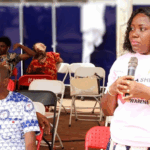
Breast cancer myths are stopping women from seeking help in Kumawu, health officials have warned.
Health workers say many women in the Sekyere Kumawu District believe the disease is spiritual or only linked to family history.
They say these false beliefs lead to fear and late hospital visits.
As part of Breast Cancer Awareness Month, the Ashanti Regional office of the National Population Council collaborated with the Sekyere Kumawu District Assembly and the Ghana Health Service to screen residents and educate them.

Mercy Adomaa Beaseah, the Regional Manager of the National Population Council Secretariat, said early detection is the best way to save lives.
“Many people still think breast cancer is a spiritual attack. We are saying it is a medical condition. It can happen to anyone. When it is found early, it can be treated.”

The teams screened residents for breast cancer, cervical cancer, and HIV.
Health workers also demonstrated how women can do regular self-checks.
Mercy said myths are forcing many women into silence and delaying treatment.
“These beliefs cause fear and stigma. People wait for pain before they go to the hospital. By the time there is pain, the disease is already advanced.”
She urged women to seek medical help as soon as they notice any change in their breasts.
“You do not need to wait for pain. Any new lump or change should be checked quickly.”
She also warned that lifestyle can increase risk.
“Family history is not the only factor. Diet and other habits also matter. So we are encouraging regular screening for every woman from age 40 and above.”
Organisers said men also have a role to play. Some men assume breast cancer is only a women’s issue.
“Men are important as husbands, fathers and brothers. They can help women check for changes and support them to go for screening.”
She stressed that the disease is not contagious and not a curse.
“We want people to stop believing false stories. Ignorance is the enemy. When we know the facts, we can protect our families.”
Health officials said cure rates are high when cases are found early.
“Breast cancer is not a death sentence,” Ms Beaseah said. “Many women survive when they get treatment on time.”
Community members who attended the screening said the event helped them understand the disease better. Some women said they had never been screened before.
The organisers plan to continue education across the district.
“We will keep going to the communities. We want everyone to hear this message. Early detection saves lives.” Ms Beaseah said.
Health workers say more outreach is needed because breast cancer remains one of the leading threats to women’s health in Ghana.